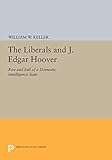The Liberals and J. Edgar Hoover : Rise and Fall of a Domestic Intelligence State / William W. Keller.
Material type: TextSeries: Princeton Legacy Library ; 954Publisher: Princeton, NJ : Princeton University Press, [2014]Copyright date: ©1989Edition: Course BookDescription: 1 online resource (230 p.)Content type:
TextSeries: Princeton Legacy Library ; 954Publisher: Princeton, NJ : Princeton University Press, [2014]Copyright date: ©1989Edition: Course BookDescription: 1 online resource (230 p.)Content type: - 9780691607221
- 9781400859887
- Anti-communist movements -- United States -- History -- 20th century
- Anti-communist movements -- United States -- History -- 20th century
- Internal security -- United States -- History -- 20th century
- Internal security -- United States -- History -- 20th century
- Liberalism -- United States -- History -- 20th century
- Liberalism -- United States -- History -- 20th century
- POLITICAL SCIENCE / American Government / General
- 353.0074 20
- E743.5
- online - DeGruyter
- Issued also in print.
| Item type | Current library | Call number | URL | Status | Notes | Barcode | |
|---|---|---|---|---|---|---|---|
 eBook
eBook
|
Biblioteca "Angelicum" Pont. Univ. S.Tommaso d'Aquino Nuvola online | online - DeGruyter (Browse shelf(Opens below)) | Online access | Not for loan (Accesso limitato) | Accesso per gli utenti autorizzati / Access for authorized users | (dgr)9781400859887 |
Browsing Biblioteca "Angelicum" Pont. Univ. S.Tommaso d'Aquino shelves, Shelving location: Nuvola online Close shelf browser (Hides shelf browser)

|

|

|

|

|

|

|
||
| online - DeGruyter Science a la Mode : Physical Fashions and Fictions / | online - DeGruyter Perestroika in Perspective : The Design and Dilemmas of Soviet Reform - Updated Edition / | online - DeGruyter Justice Rehnquist and the Constitution / | online - DeGruyter The Liberals and J. Edgar Hoover : Rise and Fall of a Domestic Intelligence State / | online - DeGruyter The Hare Krishnas in India / | online - DeGruyter Pass It On / | online - DeGruyter My Name on the Wind : Selected Poems of Diego Valeri. |
Frontmatter -- Contents -- Preface -- Abbreviations -- A Note on Sources -- CHAPTER ONE. Domestic Security in a Modern Liberal State -- CHAPTER TWO. The Liberal Theory of Internal Security -- CHAPTER THREE. A Politics of Equivocation: The Liberals, the Klan, and Dr. King -- CHAPTER FOUR. The End of the FBI-Liberal Entente -- CHAPTER FIVE. Rise of a Domestic Intelligence State -- CHAPTER SIX. Conclusion -- Selected Bibliography -- Index
restricted access online access with authorization star
http://purl.org/coar/access_right/c_16ec
In the super-heated anticommunist politics of the early Cold War period, American liberals turned to the FBI. With the Communist party to the left of them and McCarthyism to the right, liberal leaders saw the Bureau as the only legitimate instrument to define and protect the internal security interests of the state. McCarthyism provided ample proof of the dangers of security by congressional investigation. In response, liberals delegated extensive powers to J. Edgar Hoover--creating a domestic intelligence capacity that circumvented constitutional and legal controls. This balanced account of the link between liberal leaders in the United States and the growth of the FBI will appeal to a broad audience of readers interested in the American political climate. William Keller identifies a tension between liberalism and the security of the state that can never be fully resolved, and analyzes the exact mechanisms through which liberals and liberal government came to tolerate and even venerate an authoritarian state presence in their midst.The author shows how the liberal offensive against domestic communism succeeded both in weakening McCarthyism and in disabling the Communist party in the United States. What was the cost of these successes? Keller's answer assesses the liberal community's contribution to changes in the FBI between 1950 and 1970: its transformation into an independent, unaccountable political police.Originally published in 1989.The Princeton Legacy Library uses the latest print-on-demand technology to again make available previously out-of-print books from the distinguished backlist of Princeton University Press. These editions preserve the original texts of these important books while presenting them in durable paperback and hardcover editions. The goal of the Princeton Legacy Library is to vastly increase access to the rich scholarly heritage found in the thousands of books published by Princeton University Press since its founding in 1905.
Issued also in print.
Mode of access: Internet via World Wide Web.
In English.
Description based on online resource; title from PDF title page (publisher's Web site, viewed 30. Aug 2021)


